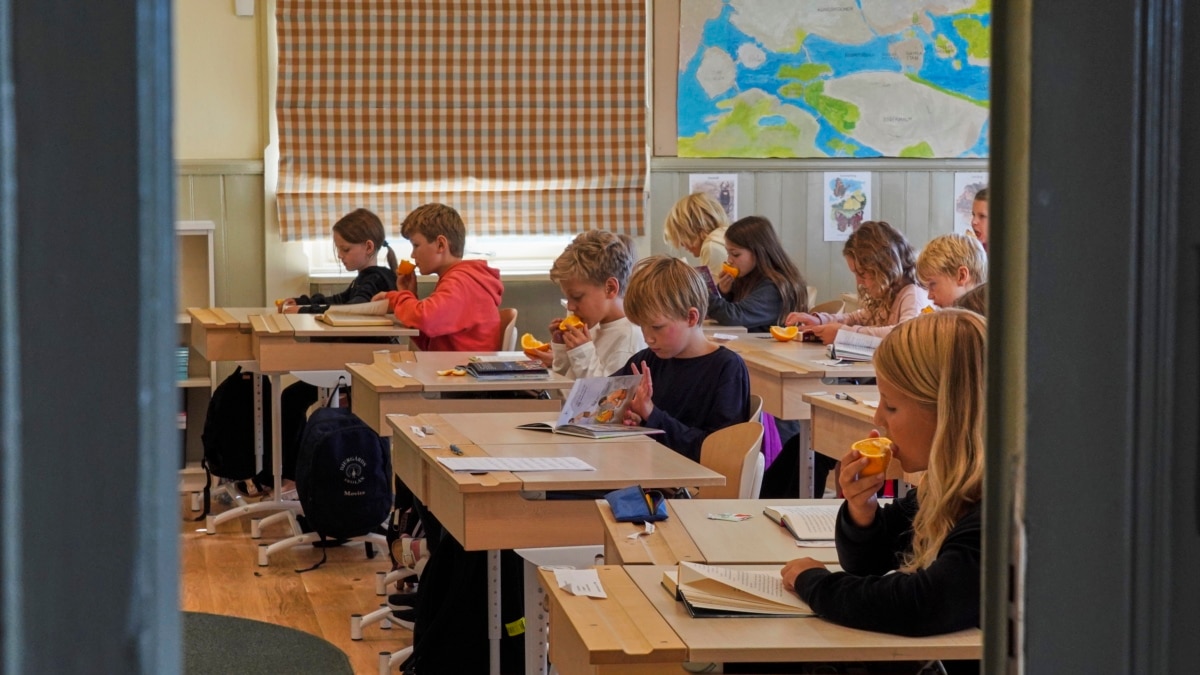As children returned to school in Sweden last month, many of their teachers were putting a new importance on some traditional skills. These included reading printed books, quiet reading time and handwriting practice. Teachers were spending less time with digital devices, online research and typing skills.
The return to traditional ways of learning might be the answer to questions raised by politicians and experts. They have questioned the country's dependence on electronic technology in education. For example, schools in Sweden have introduced tablets in preschools but critics say students are not learning basic skills as well.
Lotta Edholm is the Swedish Minister for Schools. She took office 11 months ago as part of a new center-right government. She was one of the biggest critics of the level of technology in schools.
“Sweden’s students need more textbooks," Edholm said in March. “Physical books are important for student learning.”
The minister announced last month that the government wants to reverse the decision made by the National Agency for Education to make digital devices required in preschools. The ministry told the Associated Press that it plans to stop digital learning for children under the age of six.
Sweden’s students score above the European average for reading ability. But an international test of fourth grade reading levels, the Progress in International Reading Literacy Study, showed Sweden's children had lost ground between 2016 and 2021.
Some learning loss might have resulted from the COVID-19 pandemic. The losses could also be a result of a growing number of immigrant students who do not speak Swedish as their first language. But an overuse of elect(ronic devices during school lessons may cause kids to fall behind, education experts say.
(From VOA LE)
文章を読むためのポイント:make+目的語+過去分詞
使役動詞の用法では、目的語の後に動詞の原形を置く形がよく知られていますが、目的語の後に分詞を置くという用法もあります。今回取り上げた記事の中では、make digital devices required、という表現が使われています。使役動詞+目的語+分詞の形になるのは、makeとhaveです。この場合、makeの後に置けるのは過去分詞で、haveの後に置けるのは現在分詞と過去分詞となります。Make+目的語+過去分詞の形を使う場合は、例えば、During the language exchange, I tried my best to make myself understood in French by using simple vocabulary and gestures.(言語交換中、私は簡単な語彙と身振り手振りを使いながらフランス語で自分の考えを判ってもらえるように最善を尽くしました。)Despite the noisy crowd, she raised her voice to make herself heard during the protest, ensuring her message reached everyone gathered.(騒々しい群衆にもかかわらず、彼女は抗議活動中に声を張り上げ、自分のメッセージが集まった全員に確実に届くようにした。)The artist's latest exhibition aims to make her unique perspective on modern society known to a wider audience through her thought-provoking artworks.( アーティストの最新の展覧会は、彼女の示唆に富んだ作品を通じて、現代社会に対する彼女のユニークな視点をより多くの観客に知ってもらうことを目的としています。)、などと言ったりします。
文章を読むためのポイント: lose ground.
"lose ground"という表現は、競争や対立、追求などが進行中の状況で、進展を失ったり、不利な立場になったりすることを指します。他者と比べて進歩や地位、影響力を失うことを示します。この表現は、スポーツ、ビジネス、政治、個人関係などのさまざまな文脈で使用され、勢いの喪失や逆転劇を表現します。
日本語訳:
子供たちが学校へ戻ってきたスウェーデンでは先月、たくさんの先生がいくつかの伝統的な教授法に重きを置こうとしていた。その伝統的な手法とは、印刷された本を読むこと、静かに読書をすること、手書きの練習をすること、などが含まれている。一方で、先生たちの教える時間が減ったのは、デジタル機器対応、オンライン検索、そしてタイピング技能、である。伝統的な学習方法への回帰は、もしかしたら政治家や専門家が提起している疑問への答えとなるかもしれない。政治家や専門家たちが疑問を投げかけてきたのは、教育分野における国が決めた電子技術への依存についてである。例えば、スウェーデンでは小学校入学前の教育としてタブレットが導入されたのだが、評論家が言うには、生徒たちはそれと同じように基本技能を学んでいない、とのことである。ロッタ・エドホルムはスウェーデンの教育に関する大臣である。彼女が大臣に就任したのは11か月前で、中道右派政党に所属している政治家である。彼女は以前、教育現場におけるデジタル技術水準が十分でないと強く批判していた。「スェーデンの生徒はもっと教科書を必要としている」とエドホルムは3月にこう言い始めた。「印刷された本が学生の教育には重要である。」と。大臣がそれを発表したのは先月のことで、政府は以前の決定を覆したいと考えている。国立教育庁はかつてはデジタル機器を幼稚園へ導入することを義務づけるとしていた。同省がAP通信に語ったところによると、今は6歳未満の児童に対するデジタル学習を停止する計画とのことである。スウェーデン学生が欧州平均以上の得点を獲得しているのは読む能力である。しかしながら「国際読解能力調査の進捗」という国際試験において、小学校四年生の読解水準は2016年から2021年の期間に順位を落とした。いくつかの学習損失は新型コロナウイルス感染症の流行が原因であるかもしれない。その損失は移民学生の数が増大していることが原因である可能性もある。彼らは第一言語であるスゥエーデン語を話すことが出来ないからだ。しかしながら、学校の授業においてデジタル機器を使い過ぎることが子供たちの順位を下げているのかもしれない、と教育の専門家らは述べている。

